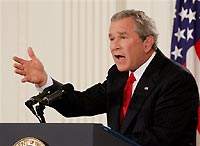Iraq a topic between Bush and the Pope during US leader's trip to Italy
U.S. President George W. Bush says he will "be in listening mode" when he meets Pope Benedict XVI for the first time on Saturday. That is a good thing, because the Pope has a lot to say.

Benedict will discuss the Iraq war and the plight of Christians in that unstable, violence-wracked country, as well as "the big ethical and social questions" of the day, said Cardinal Tarcisio Bertone, the Vatican's No. 2. This includes praise for Bush's staunch opposition to abortion.
But there is concern about the war, vigorously opposed by the late Pope John Paul II and raised on occasion by Benedict. In his Easter message, Benedict said "nothing positive comes from Iraq, torn apart by continual slaughter as the civil population flees."
Putting on his listening ears does not mean Bush will be silent, however, during his third papal audience at the Vatican.
The president plans to tout U.S. aid for fighting AIDS and malaria in Africa and spreading democracy around the world.
"I think His Holy Father will be pleased to know that much of our foreign policy is based on the admonition to whom much is given, much is required," Bush said in a pre-trip interview.
He promised to "go in open-minded."
"Sometimes I'm not poetic enough to describe what it's like to be in the presence of the Holy Father. It is a moving experience," said Bush, a Methodist, of the Roman Catholic leader. "He's a good thinker and a smart man. I'll be in a listening mode."
Bush arrived in Rome Friday night, after a stop in the Czech Republic, three days at a summit of industrialized democracies on Germany's northern coast, and a quick, three-hour visit to Poland. The president stays in Rome Saturday night, too, before going on to Albania and Bulgaria.
While in Rome, he will help back up his message to the Pope about his humanitarian record by visiting a lay Roman Catholic organization that does extensive work in the area.
The Sant'Egidio Community has a US$25 million (euro19 million) program to provide free antiretroviral drugs for HIV-positive people in 10 African countries, along with follow-up and home care.
Bush helped lead the Group of Eight summit this week to agree to a new program worth more than $60 billion (euro45 billion) to fight AIDS, malaria and other disease in Africa. The American president recently urged the U.S. Congress to double the current U.S. commitment for combatting AIDS in Africa to US$30 billion (euro22.5 billion) over the next five years.
To minimize the hassle, Bush is meetingwith the group at the U.S. Embassy instead of its headquarters in Rome's picturesque Trastavere neighborhood. He's also canceled a planned tour of the nearby Basilica of Santa Maria.
The president has a short meeting with Italian President Giorgio Napolitano at Quirinale Palace, his official residence, followed by longer talks and lunch with Premier Romano Prodi, also fresh from the G-8 meetings.
Italian-U.S. relations are busy right now - and a bit strained.
Just hours before Bush's arrival Friday, the first trial involving the CIA's extraordinary rendition program opened in a Milan courtroom. Along with the 26 Americans on trial for the abduction of an Egyptian cleric, a U.S. soldier is on trial in Rome for the March 2005 slaying of an Italian spy in Baghdad. In both cases, the U.S. citizens are being tried in absentia.
Meanwhile, a report out Friday from European investigator Dick Marty accused Italy and Germany of obstructing his probe into alleged secret prisons run by CIA in Europe. Marty said they were located in Poland and Romania from 2003 to 2005 to interrogate suspected terrorists.
Italy also has withdrawn troops from Iraq and is reluctant to send additional soldiers to Afghanistan.
Bush said he wants his visit with Prodi to "help boost his courage in doing the right thing in Afghanistan."
Washington is concerned that U.S. troops, along with those from Canada and Britain and elsewhere, are the only NATO countries sending forces to fight the Taliban in the most violent areas in the south. Other NATO-contributing countries, such as Germany, France and Italy, restrict the use of their forces to relatively peaceful areas of the north.
A series of small incidents involving the Italians and heavy fighting elsewhere in the country have heightened concerns in Italy over the mission and shaken Prodi's leadership.
Large protests against Bush are planned for Saturday. Prodi even asked Cabinet members to refrain from joining them.
Prodi ousted Silvio Berlusconi a year ago, replacing a like-minded conservative and staunch ally of Bush's with a center-left leader whose government has spared Washington no criticism.
Despite differences, Bush and Prodi have said they want good ties. Still, the U.S. leader is hedging his bets on Italian politics. He'll end his day with a private talk with his old friend Berlusconi.
Prodi's fragile, squabbling center-left coalition recently fended off a major challenge by Berlusconi in local elections. Berlusconi's camp appeared to have made some gains, but achieved no landslide.
Subscribe to Pravda.Ru Telegram channel, Facebook, RSS!


